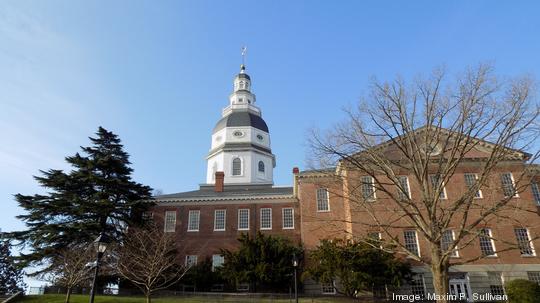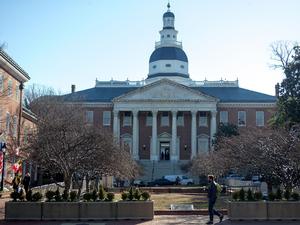
The application process has become an annual tradition in Maryland. Eager applicants open their laptops and watch the clock, counting down. Their index fingers hover anxiously above the trackpad. The moment it goes live, they have only seconds to hit submit and beat out everyone else for a chance at something extremely valuable.
No, they're not trying to score Ravens tickets. And these aren’t football fanatics. They’re investors, and they’re scrambling to get a piece of the $12 million Maryland hands out on a first-come, first-serve basis for its Biotechnology Investment Incentive Tax Credit program.
Within a minute of this year's application process going live in September, 122 investors submitted applications.
CEOs say the program is like a crowbar — it gives them leverage to pry open the door to investment capital in a risky industry. But it costs taxpayers millions of dollars each year and often benefits the same group of companies.
The Baltimore Business Journal reviewed public data on the tax credit program starting with Fiscal Year 2016, the earliest year with complete data online.
Maryland has spent more than $70 million on the tax credit since then, generating at least $140 million in investments to biotech companies. The Department of Commerce estimates jobs created by these companies have yielded less than $10 million in state tax revenue (though companies did not submit new jobs numbers for the latest report).
More than half of the money — $38 million — went to investors of 10 companies:
- American Gene Technologies International in Rockville: $7.6M
- Cellphire in Rockville: $5.3M
- Clear Guide Medical in Baltimore: $4.2M
- Ibex Biosciences in Rockville: $3.9M
- Cooltech in Baltimore: $3.6M
- DxNow in Gaithersburg: $3.5M
- CoapTech in Baltimore: $3M
- BrainScope Company in Bethesda: $2.4M
- Breethe (acquired by Abiomed in 2020) in Baltimore: $2.4M
- Sonavex in Baltimore: $2.3M
Karen Glenn Hood, communications director for the Department of Commerce, said in an email that the tax credit is not intended to drive job creation.
"[It's] intended to foster the growth of Maryland's biotechnology industry by incentivizing investment in early stage companies with the goal of increasing the number of companies developing biotechnologies in Maryland, increasing overall investments in the biotechnology sector, and increasing the number of individual investors actively investing in Maryland's life sciences companies," Glenn Hood said, noting that the state has been marketing the program to new investors and new companies.
Here’s how the tax credit has generally worked in recent years: For every two dollars an investor gives to a Maryland biotech company, the state of Maryland gives that investor one dollar. Investors from inside and outside of Maryland can participate, they just need to file a Maryland state tax return.
That means if an angel investor from California was looking for the next hot medical devices startup, a $100,000 investment in a Bethesda company would get them a $50,000 tax credit from the state of Maryland.
The tax credit has drawn criticism in recent years. Maryland lawmakers created the tax credit in 2005 and have modified it several times since then, including several tweaks in 2021. The newest changes placed restrictions on founders and current employees use of the program, capped the lifetime amount of tax credits per company at $7 million, and decreased the potential rebate for investors.
Going forward, investors will be eligible for a tax credit worth 33% of their investment — down from 50%. The Department of Commerce released a report in December that found most of the companies benefiting from the tax credit in some years were more than five years old. The new changes are intended to drive more investment to early-stage biotech companies.
Kasia Tarczynska said there are several reforms still needed. Tarczynska has researched the tax credit for Good Jobs First, a think tank critical of tax subsidies.
Every year that Maryland devotes $12 million to this tax credit means that somewhere else in Maryland’s budget — education, infrastructure, small business support — is being cut, Tarczynska said, and it could be deepening inequality.
Fiscal Year 2021 was the first time Maryland collected data on how many businesses supported by the tax credit were owned by minorities or women. Of the 22 biotech companies asked, 14 responded. None said they were minority- or women-owned businesses.
Tarczynska noted that the names of the investors are confidential.
“We don’t know who’s getting these tax breaks,” she said.
Perhaps most concerning, Tarczynska said, is that the tax credit appears to be pouring fuel on a fire that is already burning.
2021 was a record-breaking year for Maryland biotech and pharma companies. According to PitchBook, there were 48 deals and fundraising rounds worth a total of $1.1 billion — half of all the venture capital raised in Maryland last year. Of the Maryland companies with the 10 biggest VC deals, none had used the Biotech tax credit in the past six years.
“Why are Maryland taxpayers subsidizing an industry that doesn’t need any support?” Tarczynska asked.
Three biotech CEOs told the Baltimore Business Journal that the industry does need this help — and that the return is well worth it.
Jeff Galvin, CEO of American Gene Technologies in Rockville, told the Baltimore Business Journal his company has participated in the tax credit program for almost a decade for a total of $8.3 million. His company has been working on a cure for HIV, and Galvin called the biotech tax credit a “critical tool in raising money from outside Maryland.”
According to Galvin, American Gene Technologies used the tax credit as “kindling” in rounds that ultimately raised about $57 million — most of which came from California, the Midwest and Florida.
In 2015, the firm had 15 employees, but is now up to about 50, Galvin said, all of whom are Maryland residents.
“We ‘stole food out of the mouths’ of Boston and San Francisco biotech startups,” Galvin wrote, adding that Maryland would be a “desert” for risk capital if not for the Biotechnology Investment Incentive Tax Credit.
Jonathan Cohen, CEO of 20/20 GeneSystems in Rockville, said the biotech tax credit “absolutely creates investment that would not otherwise be there.” 20/20 GeneSystems has grown from about a half dozen employees in 2015 to more than 40 now, Cohen said. Investors in his company have received $2.1 million in tax credits since 2016.
Cohen said that before the program application went digital, people used to wait for days in line to apply, showing how much demand there is for the program. He recommended that the legislature double the allotment to $24 million annually.
“It’s a very good use of taxpayer funds,” Cohen said, especially compared to a typical grant program. “Here you’re getting a three-to-one match.”
Murat Croci had a more tempered response. He is the co-founder of Ibex Biosciences which has locations in Rockville and Cumberland. Investors in Ibex have gotten $3.9 million in tax credits since 2016, which helped fuel product development.
Judging the biotech tax credit is complicated because companies take years to develop drugs or medical devices, which then undergo clinical trials followed by government approval, he said. That's a long and risky path for investors.
Croci pointed to his own company, which he said has been working on promising drugs for lung and liver cancers and hopes to have clinical trials in two to three years. He was quick to say that there is still significant work ahead, but said that if the drugs are a success, it'll be because of the biotech tax credit.
Some companies that have benefited from the program turned out to be duds, Croci said, and he understands why taxpayers would be concerned about that. But if just one out of 10 biotech companies has a hit product, Croci believes it would be a game changer for Maryland and would mean the tax credit was more than worth it. He thinks the legislature should restore the 50% match to the program, but more oversight could be beneficial.
“At some point, it shouldn’t just be blind faith,” Croci said. “I think there should be accountability.”









